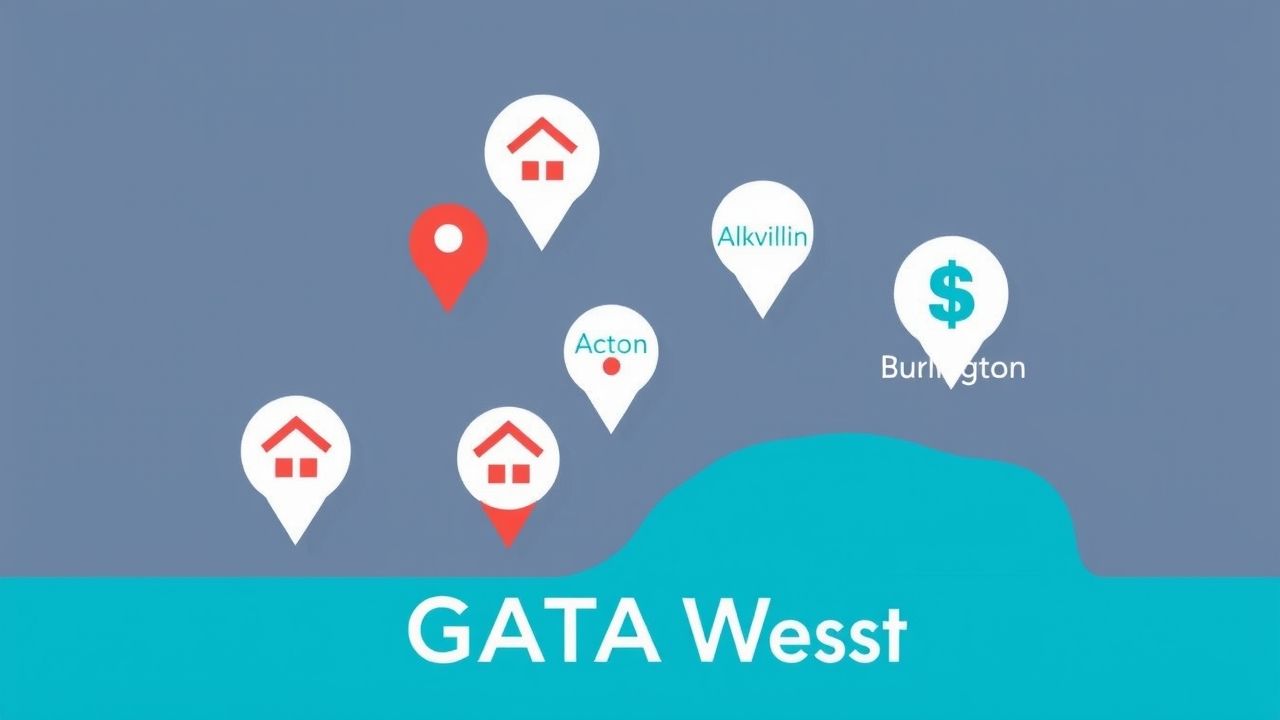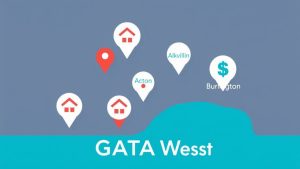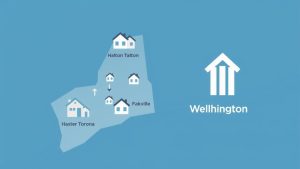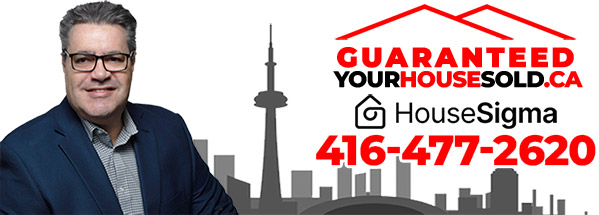Feeling lost trying to buy or sell a house in the GTA? Like you’re navigating a maze blindfolded? You’re not alone. This guide cuts through the noise. It gives you the real steps for buying and selling in Georgetown, Milton, Guelph, Acton, Oakville, and Burlington. No fluff, just what you need to know.
Understanding the Crazy GTA Market (2024-2025)
The Greater Toronto Area real estate market is always moving. What happened last year isn’t what’s happening now. And what’s happening in downtown Toronto isn’t the same as in Guelph or Milton.
What’s Happening Now? (Trends for GTA West)
Okay, let’s talk real numbers and trends for 2024, looking towards 2025. Interest rates went up, cooled things down a bit. But demand in desirable areas like Oakville, Burlington, Milton, Guelph, Georgetown, and even Acton is still strong. We saw prices dip slightly in late 2023, but they started firming up in early 2024. Buyers are cautious but still looking. Sellers need to be realistic about pricing.
- Inventory: It’s still tight in many spots. Good houses priced well sell fast. We saw inventory creep up a little in mid-2024, giving buyers slightly more choice than the frenzy of 2021-2022, but it’s far from a buyer’s market across the board.
- Prices: Expect modest growth overall in 2024, maybe picking up more in 2025 if rates ease. Some areas might see small dips, others small gains. It’s very neighbourhood specific.
- Bidding Wars: Less common than before, but they still happen for great properties in prime locations, especially in Burlington and Oakville. Milton and Guelph see them too, just maybe not as intense.
- Days on Market: Homes are sitting a bit longer than peak frenzy, maybe 20-30 days on average in many GTA West towns, but well-priced homes can still go in a week or two.
Spotlight: Georgetown & Acton
These Halton Hills towns offer a bit more breathing room, often more house for your money compared to Milton or Oakville. Georgetown has that small-town charm but with good commuter access. Acton is even more affordable, attracting buyers priced out elsewhere. Trends here often follow Milton but with a slight lag. Expect steady demand, especially from young families looking for value.
Spotlight: Milton
Milton‘s growth has been huge. It’s a family hotspot. Good schools, parks, and newer homes draw people in. The market here is sensitive to interest rates because many buyers are stretching their budgets. Expect continued demand, but prices need to match the market realities. Proximity to the 401 and GO Transit is a major plus. 2024 saw steady sales, but buyers are pickier about condition and price.
Spotlight: Guelph
Guelph has its own vibe. The university keeps the rental market strong and influences the types of properties in demand. It has a strong local economy and a focus on community. Prices held up relatively well compared to some other areas. Buyers love the downtown core and established neighbourhoods. Expect a stable market, less volatile than areas closer to Toronto. Finding a real estate agent in Guelph who knows the local nuances is key.
Spotlight: Oakville & Burlington
These areas command higher prices, thanks to Lake Ontario, great schools, and established communities. Oakville especially is known for luxury homes. Burlington offers a mix, with lovely lakeside areas and more affordable spots further north. Both markets saw a slowdown with rate hikes but remain desirable. Sellers here often have more equity. Buyers need significant budgets. Expect stability at the high end, maybe more negotiation room in mid-ranges. Selling your house fast Burlington often means pricing it perfectly from day one.
Why This Matters for You
Knowing the specific trends in the town you care about is crucial. Don’t rely on general GTA headlines. Are you buying? Understand the competition level and how much negotiating power you might have. Are you selling? Know how to price your home to attract serious buyers without leaving money on the table. This local info shapes your strategy.
Getting Your Money Right: Financing Your GTA Home
Buying a home starts with money. Boring, i know. But get this part wrong, and everything else falls apart. Especially in the expensive GTA.
Why Pre-Approval is King
Forget browsing listings first. Get pre-approved for a mortgage before you look. Seriously. Here’s why:
- Know Your Budget: A pre-approval tells you exactly how much a lender will likely give you. No more guessing or falling in love with homes you can’t afford.
- Shows You’re Serious: Sellers prefer offers from pre-approved buyers. It means you’re less likely to have financing fall through.
- Speed: In a fast market, you need to move quickly. Pre-approval lets you make an offer faster.
Go to your bank or, even better, talk to a mortgage broker. They shop around different lenders for you.
Mortgage Types Explained Simply
- Fixed Rate: Your interest rate stays the same for the whole term (like 5 years). Predictable payments. Good if you think rates will go up.
- Variable Rate: Your interest rate can change based on the bank’s prime rate. Payments might go up or down. Can save money if rates fall, but riskier if they rise.
- Open vs. Closed: Open lets you pay off more or all of it early without big penalties, but rates are higher. Closed has limits on extra payments, but rates are lower (most people get closed).
Talk to your broker about what fits your life and risk comfort.
Finding a Good Mortgage Broker
Ask friends, family, or your real estate agent for recommendations. Look for someone experienced in the GTA market. They understand local lender preferences and programs. They should explain things clearly, not just push the lowest rate.
Down Payments: How Much You Really Need
In Canada, the minimum down payment depends on the home price:
- $500,000 or less: 5% down
- $500,001 to $1 million: 5% on the first $500k, 10% on the portion above $500k
- Over $1 million: 20% down
If your down payment is less than 20%, you must get mortgage default insurance (like CMHC). This protects the lender, and you pay the premium. It gets added to your mortgage amount.
Remember: A bigger down payment means smaller mortgage payments and no insurance premium. Save as much as you can.
Ontario First-Time Buyer Help
If this is your first rodeo, look into these:
- First-Time Home Buyer Incentive (Federal): Shared equity mortgage. The government helps with the down payment in exchange for a share of the home’s future value. Strict rules apply.
- Home Buyers’ Plan (Federal): You can borrow from your RRSPs (up to $35,000 per person) tax-free for a down payment. You have to pay it back over 15 years.
- Ontario Land Transfer Tax Rebate: First-time buyers can get a rebate of up to $4,000 on the provincial land transfer tax. If you buy in Toronto, there’s a municipal land transfer tax too, with its own rebate.
Check the official government websites for the latest rules and eligibility. These programs can make a real difference.
Costs You Forget: Closing Costs
Your down payment isn’t the only cash you need upfront. Budget for closing costs, which can be 1.5% to 4% of the purchase price. These include:
- Land Transfer Tax (Provincial & potentially Municipal): This is often the biggest one. Use an online calculator.
- Legal Fees: Paying your lawyer to handle the paperwork.
- Title Insurance: Protects you and the lender against title fraud or errors.
- Home Inspection: You pay the inspector directly.
- Adjustments: Paying the seller back for prepaid property taxes or utility bills.
- Mortgage Insurance Premium (if applicable): Sometimes paid upfront, sometimes added to mortgage.
Don’t get caught short. Ask your lawyer and mortgage broker for estimates.
Expert Quote: “Even with rates stabilizing, the stress test impacts buying power significantly in the GTA. Explore all options, including credit unions, especially for first-time buyers in areas like Acton where affordability is a major factor.” – David Miller, GTA Mortgage Specialist.
Buying a Home in the GTA: Your Step-by-Step Plan
Alright, you’re pre-approved. Now the fun part: finding your home. Here’s a simple plan.
Finding the Right Real Estate Agent
Yes, you can buy without one, but especially in the complex GTA market, a good agent is worth it. They:
- Know the local market (Guelph is different from Oakville).
- Have access to listings (sometimes before they hit Realtor.ca).
- Help you write a strong offer.
- Negotiate for you.
- Guide you through the paperwork.
Interview a few agents. Ask about their experience in the specific towns you like. Find someone you trust and who communicates well.
Your Wish List vs. Reality
Dream big, but be realistic. Make two lists:
- Needs: Things you absolutely must have (e.g., number of bedrooms, location near GO train).
- Wants: Things that would be nice but you could live without (e.g., finished basement, specific street).
Share these lists with your agent. Be prepared to compromise, especially in competitive areas like Milton or Burlington.
Searching for Homes
Your agent will set you up with automatic searches. You can also look online (Realtor.ca, other portals). Drive around neighbourhoods you like. See a ‘For Sale’ sign? Tell your agent.
Be ready to see houses quickly. Good ones don’t last long.
Making an Offer That Wins
Found ‘the one’? Your agent helps you write the Offer to Purchase. Key parts:
- Price: What you’re willing to pay. Your agent advises based on comparable sales (‘comps’).
- Deposit: Shows you’re serious (usually 5% of price, held in trust).
- Conditions: Clauses that must be met for the deal to finalize. Common ones:
- Financing Condition: You need final mortgage approval.
- Inspection Condition: You need a satisfactory home inspection.
- Sale of Buyer’s Property Condition: You need to sell your current home (less common in seller’s markets).
- Status Certificate Condition (for condos): Your lawyer needs to review the condo docs.
- Closing Date: When you officially take ownership.
In hot markets, you might need to offer the asking price or more, maybe even without conditions (risky!). Your agent will guide you based on the current situation.
Home Inspections: Don’t Skip This
Unless you’re a contractor, get a home inspection. It costs maybe $400-$600, but can save you thousands. The inspector checks the house’s structure, roof, plumbing, electrical, heating/cooling. They give you a detailed report.
If the inspection finds big problems, you can:
- Walk away (if you have an inspection condition).
- Negotiate with the seller to fix it or lower the price.
- Accept it and budget for repairs.
A home inspection in Oakville on an older home might reveal different issues than one in a newer Milton subdivision. The inspector should know local building practices.
The Closing Process: What Happens?
After your offer is accepted and conditions are met (‘firm deal’), your lawyer takes over.
- They search the property title (looking for issues like liens or easements – more on that later).
- Arrange title insurance.
- Coordinate with your lender.
- Calculate final closing costs.
- Prepare documents for you to sign.
- On closing day, they exchange money and documents with the seller’s lawyer.
- You get the keys!
Stay in touch with your lawyer and agent during this time.

Selling Your GTA House: Getting Top Dollar Fast
Ready to sell? It’s more than just putting up a sign. Here’s how to do it right in the competitive GTA market.
Is Now a Good Time to Sell in Your Town?
Again, local matters. Is inventory low in Georgetown? Are prices rising in Burlington? Your real estate agent provides this specific data. Generally, spring (March-May) and fall (September-October) are busy seasons. But people buy and sell year-round. Your personal timeline is often the most important factor.
Pricing It Right
This is THE most important step. Price too high, and buyers ignore it. Price too low, and you lose money. Your agent prepares a Comparative Market Analysis (CMA). This compares your home to similar ones recently sold, currently listed, or expired in your area.
Consider:
- Recent Sales: What did comparable homes actually sell for?
- Current Competition: What are similar homes listed for now?
- Market Conditions: Is it a buyer’s, seller’s, or balanced market in your neighbourhood?
Be objective. Your emotional attachment doesn’t add market value. Trust the data and your agent‘s expertise.
Getting Your Home Show-Ready
Buyers judge books by their covers. First impressions matter.
- Declutter: Less is more. Pack away personal items, extra furniture. Make rooms feel spacious.
- Deep Clean: Floors, windows, bathrooms, kitchen. Make it sparkle.
- Repairs: Fix leaky faucets, cracked tiles, scuffed walls. Small things make a big difference.
- Curb Appeal: Mow the lawn, weed gardens, paint the front door. Make buyers want to come inside.
- Staging (Optional but Recommended): Professional stagers arrange furniture and decor to highlight your home’s best features. It can significantly boost appeal and price.
Marketing That Works
Your agent handles most of this, but understand what’s involved:
- Professional Photos/Video: Phone pics don’t cut it. High-quality visuals are essential for online listings.
- Online Presence: MLS listing, agent‘s website, social media.
- Feature Sheets: Highlighting key details for buyers during showings.
- Open Houses/Showings: Your agent coordinates these.
Handling Showings and Open Houses
- Be flexible with showing times.
- Leave the house during showings. Buyers feel awkward with owners present.
- Keep it tidy constantly. You never know when a showing request will come.
- Secure valuables and medications.
Negotiating Offers: Getting the Best Deal
You might get one offer or multiple. Your agent presents all offers to you. Consider:
- Price: Is it close to your asking price?
- Conditions: Are there many? Are they reasonable?
- Deposit: Is it a good amount?
- Closing Date: Does it work for you?
You can accept an offer, reject it, or make a counter-offer. Your agent advises on strategy based on the market and the offer details.
Tips for Selling Your House Fast in Burlington or Milton
These markets can be competitive. To sell quickly:
- Price aggressively: Be slightly below comparable recent sales to generate buzz.
- Be show-ready from Day 1: Don’t wait to declutter or fix things.
- Allow easy showing access: Use a lockbox, approve requests quickly.
- Consider a pre-listing inspection: Find and fix problems before buyers do. You can provide the report to potential buyers.
- Offer incentives? Maybe cover some closing costs (less common, discuss with agent).
Expert Quote: “Buyers in Georgetown right now need strong pre-approvals, and sellers need to be realistic. Even in a market showing signs of life like we saw in early 2024, pricing your home correctly from the absolute start is the key to attracting serious offers and avoiding unnecessary time on market.” – Sarah Chen, Local Real Estate Agent.
The Legal Stuff: Easements and Covenants Explained
Okay, this part sounds technical, but it’s super important. When you buy property, you’re not just buying the house and land. You’re also buying any legal strings attached. These are called encumbrances. Two big ones are easements and restrictive covenants.
What are Property Encumbrances? Why You Must Know.
An encumbrance is a claim or right someone else has on your property. It can limit what you do with your land or grant someone else access. Not knowing about them before you buy can lead to big headaches later. Your lawyer’s job includes searching for these.
Understanding Property Easements
What is an Easement? (Simple Terms)
Think of it as permission. An easement lets someone else use a part of your property for a specific purpose, even though you own it. They don’t own that part, but they have a legal right to use it.
Common Types: Utility, Shared Driveways, Access
- Utility Easements: Super common. Lets utility companies (hydro, gas, water, internet) access your land to install or maintain lines or equipment. You might have a green electrical box on your lawn – that’s usually on an easement.
- Shared Driveway Easements: If you share a driveway with a neighbour that crosses property lines, there’s likely an easement defining who can use it and how.
- Access Easements (Right-of-Way): Allows someone to cross your property to get somewhere else, like a neighbour needing to cross your yard to reach their backyard, or access to a public path or beach.
Appurtenant vs. Gross
- Appurtenant: Tied to the land. If you sell your house, the easement stays with the property for the next owner. Benefits a specific neighbouring property (like the shared driveway).
- Gross: Benefits a person or company, not a specific property (like a utility easement). Doesn’t automatically pass to the next owner of the company, but stays with your property.
Public vs. Private
- Public: Grants rights to the public or government (like a path to a park).
- Private: Grants rights to specific individuals or entities (like your neighbour).
Affirmative vs. Negative
- Affirmative: Allows someone to do something on your property (e.g., use the driveway).
- Negative: Stops you from doing something on your property that might interfere with someone else’s rights (e.g., you can’t build a fence that blocks access to a shared path defined by an easement).
How They Are Created (Grant, Reservation, etc.)
Easements usually start with a written agreement (grant). Sometimes, when someone sells part of their land, they keep an easement for themselves (reservation). They can also be implied by circumstance or arise from long-term, unchallenged use (prescription – like ‘squatter’s rights’ but just for use, not ownership).
Finding Easements on a Property
How do you know if a property has easements? Your lawyer and title insurance are key here.
- Seller Disclosure: Sellers should disclose known easements.
- Title Search: Your lawyer searches public records. Easements are usually registered on the property’s title.
- Title Insurance: Protects you if an unknown, registered easement pops up later.
- Property Survey: A map showing property lines and registered easements. Useful, sometimes required by lenders.
- Ask! Ask the seller or listing agent directly.
Don’t ignore easements. They can impact your plans for fences, pools, or additions.
Restrictive Covenants Ontario Real Estate
Now, let’s talk about rules. Restrictive covenants are rules tied to your property that limit how you can use it.
What are Restrictive Covenants?
These are promises written into the property deed or a separate legal document. They ‘run with the land,’ meaning they apply to you and all future owners. Usually created by developers to maintain a certain look or standard in a neighbourhood, or by homeowners’ associations (HOAs).
Types of restrictive covenants
They can cover many things:
- Use Restrictions: e.g., No businesses run from home, only single-family residential use.
- Lease Restrictions: e.g., Minimum lease term, no short-term rentals (like Airbnb).
- Maintenance Requirements: e.g., Rules about lawn care, fence condition.
- Architectural Controls: These are common in newer subdivisions. They dictate things like:
- Exterior paint colours
- Roofing materials
- Fence height and style
- Minimum house size
- Whether you can park a boat or RV in your driveway
- Rules for additions or sheds
Impact of covenants on home use
How do these rules affect you?
- Benefits: Can protect property values by keeping the neighbourhood looking consistent and preventing nuisances. Can foster community standards.
- Drawbacks: Limit your freedom. You might not be able to paint your house bright pink, build the fence you want, or run your home-based business, even if zoning laws allow it. Can lead to disputes with neighbours or the HOA.
Affecting property value
Covenants often aim to protect value by ensuring uniformity and preventing undesirable uses. However, overly strict or outdated covenants could potentially deter some buyers, slightly hurting value or making the home harder to sell.
Checking for covenants before buying
Just like easements, finding covenants involves:
- Seller Disclosure: Ask the seller/agent.
- Title Search: Your lawyer will look for registered covenants.
- Offer Documents: The Agreement of Purchase and Sale might mention them.
- HOA Documents (if applicable): If there’s an HOA, review its rules carefully.
Read them! Understand what you can and cannot do before you buy.
Disclosure of restrictive covenants
Sellers in Ontario generally need to disclose significant restrictions they know about that could affect the property’s use or value. Hiding a major covenant could lead to legal trouble.
Enforcing restrictive covenants
Who makes sure you follow the rules?
- Neighbours: Another property owner subject to the same covenant can potentially take legal action if you violate it.
- Homeowners’ Association (HOA): If the covenant is part of HOA rules, the HOA can enforce it (warnings, fines, legal action).
Legal implications of covenants
These are legally binding. Ignoring them can result in lawsuits or fines. Removing or changing a covenant is difficult, often requiring agreement from many other homeowners or a court order proving the covenant is obsolete or unreasonable.
Negotiating covenant terms
Can you change them? Usually, no. Especially not during a purchase. These are typically set for the entire neighbourhood or subdivision. You’re generally buying the property ‘as is’ with the existing covenants.
Other Legal Bits: Title Insurance, Land Transfer Tax
- Title Insurance: Buy it. It protects against title defects, liens, fraud, and some easement/covenant issues (read the policy!). One-time fee paid at closing.
- Land Transfer Tax (LTT): Paid by the buyer in Ontario. Calculated as a percentage of the purchase price. Use an online LTT calculator. Remember potential municipal LTT in Toronto.
Why You Need a Real Estate Lawyer
Don’t try to DIY the legal side. A lawyer experienced in Ontario real estate:
- Reviews the purchase agreement.
- Searches the title (finds easements, covenants, liens).
- Explains legal documents to you.
- Arranges title insurance.
- Handles the money transfer on closing.
- Ensures you get clear ownership.
They protect your interests throughout the closing process.
Making the Move: Tips for a Smooth Transition
You bought or sold, congrats! Now the ‘fun’ part: moving.
Planning Your Move
- Timeline: Start planning weeks, even months, ahead.
- Budget: Moving costs add up (movers, boxes, cleaning, utility hookups).
- Declutter Before Moving: Why pay to move stuff you don’t need?
- Book Movers Early: Especially during busy seasons (summer, end of month).
Hiring Movers vs. DIY
- Movers: More expensive, but saves time and physical effort. Get quotes from several reputable companies. Check insurance and reviews.
- DIY: Cheaper, but lots of work. Renting a truck, packing, heavy lifting. Enlist friends (bribe with pizza!).
Changing Address and Utilities
- Canada Post: Set up mail forwarding.
- Utilities: Arrange disconnection at your old place and connection at your new place (hydro, water, gas, internet, cable). Do this well in advance.
- Update Address: Banks, credit cards, driver’s license, health card, subscriptions, loyalty programs, work, school.
Settling Into Your New GTA Community
Whether it’s Guelph‘s historic streets or Milton‘s family parks:
- Explore your neighbourhood.
- Introduce yourself to neighbours.
- Find local amenities (grocery stores, parks, community centres).
- Register kids for school.
- Enjoy your new home!
FAQ: Your GTA Real Estate Questions Answered
Here are answers to common questions about buying and selling in Georgetown, Milton, Guelph, Acton, Oakville, and Burlington.
-
Q: How much deposit do i need when making an offer?
- A: Typically 5% of the purchase price in the GTA. It shows the seller you’re serious. It’s held in trust until closing.
-
Q: What are ‘comps’ and why do they matter?
- A: Comps (comparables) are similar homes in your area that recently sold. They are the best indicator of current market value for pricing your home to sell or deciding how much to offer.
-
Q: Do i really need a home inspection?
- A: Highly recommended, especially for older homes. It identifies potential problems you can’t easily see. Skipping it is risky.
-
Q: What’s the difference between an easement and a right-of-way?
- A: A right-of-way is a type of easement. It specifically grants the right to travel across a property (like a path or driveway).
-
Q: Can i build a shed if there’s a utility easement in my backyard?
- A: Maybe not directly on the easement. The utility company needs clear access. Check the easement documents or ask the utility company before building anything.
-
Q: My neighbour isn’t following a restrictive covenant. What can i do?
- A: Talk to them first. If that fails, check how the covenant is enforced (HOA rules?). You might need legal advice if it’s a serious issue impacting your property.
-
Q: Are restrictive covenants common in older neighbourhoods like parts of Guelph or Oakville?
- A: They can exist anywhere, but are very common in newer subdivisions built by large developers (like many in Milton). Older areas might have fewer, or older ones that are less relevant today, but always check the title.
-
Q: What happens if i buy a house and then find out about a restrictive covenant i don’t like?
- A: You’re generally bound by it. This highlights why checking before you buy is crucial. Title insurance might offer some protection, but usually not against known or disclosed covenants.
-
Q: How are property taxes calculated in places like Burlington or Georgetown?
- A: The municipality assesses your property value (MPAC assessment). They multiply this by the municipal tax rate (set annually) to determine your bill. Rates vary by municipality.
Buying or selling a home in the GTA is a big deal. It takes planning, patience, and the right information. Knowing about market conditions, financing, the process, and those tricky legal details like easements and restrictive covenants Ontario real estate puts you in control. Use this guide, ask questions, and work with good professionals. You’ve got this.
If this guide helped, share it with someone else navigating the GTA market. Got questions about your specific situation in Georgetown, Milton, Guelph, Acton, Oakville, or Burlington? Drop a comment below or reach out for personalized advice. Taking the next step starts now.






















